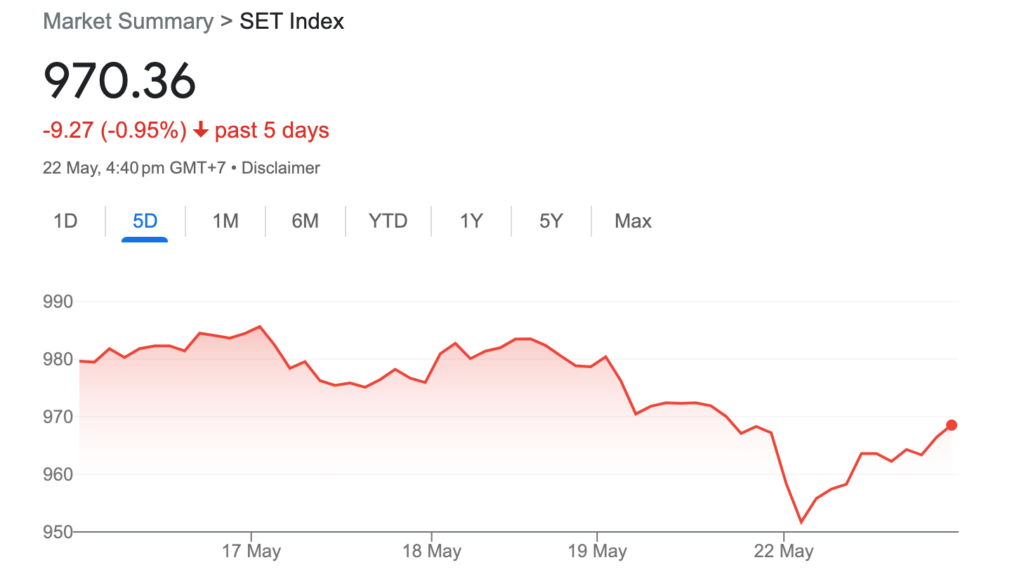Thai electorates hope to achieve a democratic transition of power for the first time in 10 years after they voted in favor of having the Move Forward Party into power. With the political landscape shifts, the question on the minds of investors and analysts alike is this: What does the Move Forward Party’s victory signify for the Thai economy and stock market?
The Politic Change and its Economic Impact
With the Move Forward Party winning an impressive 151 seats in the recent elections, its leader, Pita Limjaroenrat, is believed to become the country’s 30th Prime Minister if a coalition government can be successfully formed.
The initial reactions have been mixed. A week after the election, the benchmark SET Index fell by about 1.5%, while the baht has seen a decline of more than 1% after an initial rise of up to 0.9% against the dollar. What lies beneath these surface-level changes?

The Promise of Growth: Retail and Tourism
With the election outcome swinging in favor of the Move Forward Party, we may witness a renaissance in critical economic sectors such as retail, banking, and tourism, not forgetting the life-sustaining artery of the Thai economy.
The incoming government has committed to infusing dynamism and innovation. On the retail front, there’s a strong prospect for entities like Central Retail Corp (CRC.BK), Robinson Department Store (ROBINS.BK), and Big C Supercenter (BigC.BK) to reap the benefits of anticipated policy measures. Reducing energy expenses and an uptick in minimum wages could drive consumer spending and breathe new vigor into this industry.
Meanwhile, the tourism industry, which remains integral to the Thai economy, might be on the brink of a significant revival. If the transition of power goes smoothly, the tourism industry, boosted by the return of visitors after the global health crisis, could see a revival and brighter days under the new government.
Anticipating Potential Market Volatility
Despite the excitement surrounding the victory of the Move Forward Party, one must remember that the Thai stock market is likely to remain volatile in the short term. Investors and analysts will closely observe the new government’s formation and its proposed policies’ rollout.
Dan Fineman, co-head of APAC equity strategy at Credit Suisse, sees a “good trading opportunity” in this post-election scenario, noting a historical trend of market underperformance before elections and outperformance following the formation of a stable government.
However, there remain some grey areas. What if the election commission disbands opposition parties? Such a move could trigger a negative market reaction, igniting street protests. If another coup occurs, Thailand’s investment market will likely suffer significant consequences.
The Economic Outlook Beyond Elections
Thai central bank interest rate currently stands at 1.75%, with a meeting slated for 31 May. Citi economist Nalin Chutchotitham has a positive outlook, expecting the Bank of Thailand to raise its benchmark interest rate by another 25 basis points.
Given this, with the new government likely to be confirmed in August and the 2023 fiscal budget announced in the last quarter, the Thai economic outlook seems relatively unchanged in the coming few months.
Overall, Thailand’s economy in the first quarter grew by 2.7% compared to last year’s period, better than the 2.3% estimated initially by Bloomberg analysts. This is mainly thanks to the return of tourists after the pandemic. However, the economic outlook still depends on whether the power transition can proceed smoothly after the election.
Conclusion: A New Era of Possibilities
As we have seen in other global markets, post-election periods often lead to volatility, shifting priorities, and reevaluating economic strategies. It’s safe to presume that The same principle applies to Thailand, particularly since the formation of the country’s new government remains unconfirmed.
Amidst this uncertainty, the overwhelming sentiment is one of cautious optimism. Forming a coalition government, particularly one that holds promise for pro-growth strategies, could potentially revive Thailand’s economic landscape. As the Move Forward Party takes the helm, the Thai market will be watching, waiting, and ready to move with the tides of change.




